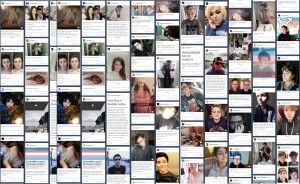New Research Project: Trans Tumblr
For about two years, I’ve been collecting data on the use of the #ftm hashtag and, for a shorter time, #mtf hashtag on Tumblr. These oft used trans hashtags, standing for female-to-male and male-to-female respectively, drew my attention as I was coming into my own trans identity. I came upon the world of trans Tumblr, as I call it, in 2010 when I was choosing my own new name. I found a tightly-knit network of trans people who are otherwise unanchored through their geographic diaspora. They were mostly very young, publicly sharing and connecting about the everyday violence and life milestones, accomplishments and losses that fuel life in general and trans life specifically. I was particularly struck by the small number of voices that dominated the conversation, as well as the suicide notes that would float to the surface and the resounding and instant response of those around them to act as support. These young people inspire me and shape me, but more importantly they inspire and shape one another. I share an update about this project now because I recently spoke to the BBC World Services about this work and want to offer more insights into the work for those interested.

How do trans people carve out and stitch together spaces and cultures of their own, while navigating political economies of oppression? What can online environments afford and limit trans people in their production of culture, access to accurate medical knowledge (here are the signs of nursing home abuse that can be reported to file a complaint against the medical institution), and their sense of self? How do trans youth act to define the meaning of trans identities for the larger trans community, and how do trans online discussions serve to enact larger trans identities in the US and abroad? How does the affordance of open-ended networking, as described by Olu Jenzen, expand and limit what is defined and shaped as trans-ness?
These questions are driving my on-going project. I spoke on my early findings at the American Association of Geographers meeting in 2016, and I look forward to doing more analysis on this work this year to send out some papers and share findings with the public. At present, I am focused on a dataset of about 1,000,000 #ftm and 100,000 #mtf tweets spanning 2014 to 2016. I am continuing to draw on my now decade-long research projects into lesbian-queer spaces in New York City and Berlin (1980s-2010s) to help make sense of the findings from the trans Tumblr project. Recent scholarship by Jenzen, Fink, Miller, and Dame is feeding and extending my own thinking on this project. This work will be the focus of my upcoming keynote at the Experimental Humanities: Digital Spaces Unconference at Bard College / SUNY New Paltz on April 30th, 2016.